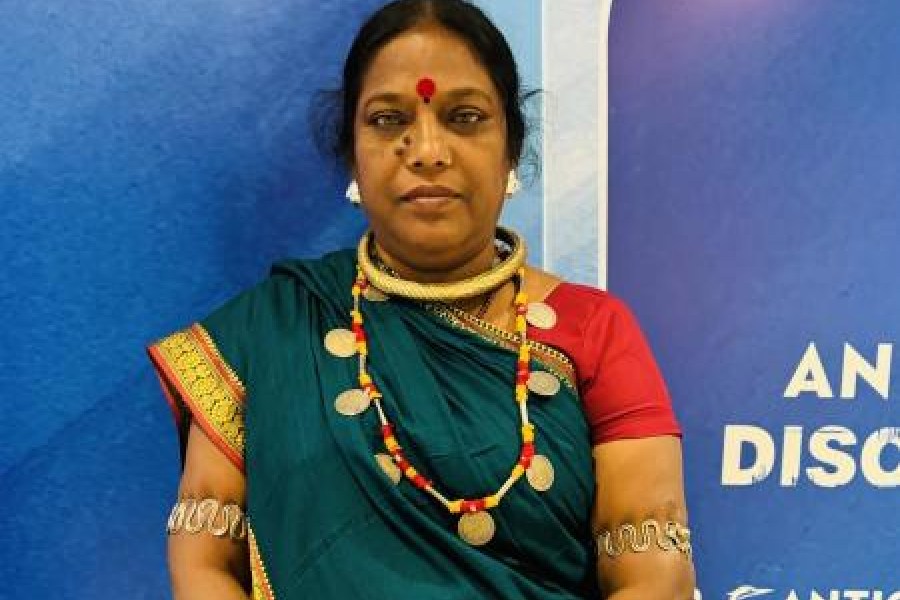Poonam Bai was barely five years old when she decided she liked the spotlight. Her mother was a nacha performer — a form of folk theatre practised in Chhattisgarh — and Poonam was at the performance to babysit her infant brother. “I started performing nacha from the age of eight,” says the 60-year-old as she gets ready to perform at the Kolkata Centre for Creativity auditorium one afternoon. Nacha is particularly well known because it was adopted by the playwright Habib Tanvir in the 1960s.
That day in Calcutta, Poonam is presenting a medley of songs — Chhattisgarhi folk as well as songs based on Chhattisgarhi tunes that were used in Naya Theatre’s plays — with her group Rang Chhattisa. Naya Theatre is the theatre company Tanvir set up in 1959. Along with nacha, Poonam has Naya Theatre in her veins. “Habibsaab saw me at a performance and asked my father if he would send me to Delhi to work in Naya Theatre.”
She was 13 years old then and her father, who was a musician with Naya Theatre, was not convinced. Feeta Bai Markam, who played the rani in Tanvir’s Charandas Chor, convinced Poonam’s father. Feeta is Poonam’s aunt. The unlettered Poonam stayed with Naya Theatre for the next couple of decades and more, learning the art of theatre and earning what she calls “Habibsaab se degree”. A lot of it involved unlearning what she had learned in nacha.
“There is a huge difference between nacha and theatre. In nacha, we could enter from anywhere and sing and dance however we like. In theatre, we have to learn the right way to enter the stage. We have to learn where to stand, how much to move, where to exit.”
Poonam grew up to be a formidable performer with the verve and voice of her famous aunt. Eventually, she took on the mantle of rani in Charandas Chor. And she went on to marry the man famous for playing Charandas Chor, Deepak Virat Tiwari. As she tells it — with emphasis and all — yes, she is from a landless family belonging to a marginalised community in a remote village and he, from a Brahmin family in Bilaspur city, with a government job and all.
Life must not have been easy but there is a glow of happiness on Poonam’s face when she talks about her husband, though the memories are not all happy. “Deepak was a very supportive husband. He always encouraged me. I would sometimes get called to Mumbai, to sing in art films or do jingles. He always encouraged me to go and I always took him with me, even after he fell ill,” Poonam remembers. Sangeet Natak Academy Award winner Tiwari was paralysed and in a wheelchair since 2008. He passed away in 2021.
Tiwari and Poonam had four children, two sons and two daughters. “My children too would act in Naya Theatre,” says Poonam. “In Agra Bazar, they played the roles of monkeys, bears and cattle. We were the only ones whose children were with them in Naya Theatre so they played all the kids’ roles.” Poonam’s youngest daughter Divya is a part of Rang Chhattisa and was in Calcutta with her mother. “I was born much too late to learn anything from the legends in Naya Theatre,” regrets Divya, who was born in 1995. None of the children made it to college but all of them learnt the creative arts.
Poonam’s younger son Suraj was especially talented. “He used to play the harmonium, tabla, dholak and also sing. He used to act well. He would have taken Rang Chhattisa to new heights,” says Poonam with tears in her eyes. Suraj had learnt all he knew at the feet of Naya Theatre elders. Unfortunately, Suraj had a heart attack while playing the tabla on stage and passed away. He was not yet 30. “Chola mati ke hai Ram,” hums Poonam. “This is the song I saw him off with. This is the song he had wanted to hear from me,” says Poonam as she continues singing the Chhattisgarhi song used in the play Bahadur Kalarin. Fat tears roll down her face.
But there is one thing more powerful than grief — hunger. Poonam also had to bring up her eight-year-old grandson whose mother had walked away long ago. Kala-
kari was her only skill and Poonam, who had cut down on performances, decided to take to the stage again. She says, “I worked for a very long time, I didn’t feel like working anymore. But life has to go on.” She went back to helming Rang Chhattisa.
She says, “Whenever someone calls us, we come running. We don’t ask how much money they will give or what they will do for us. Bhagwan ka hukum hain, Habibsaab ka ashirwad hain. That is why we are still working on stage.”











